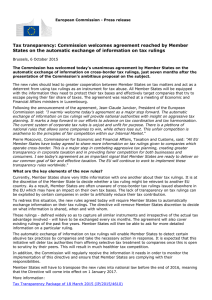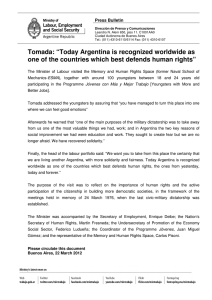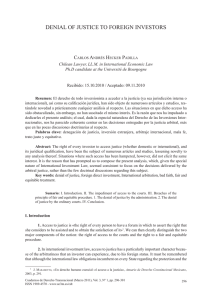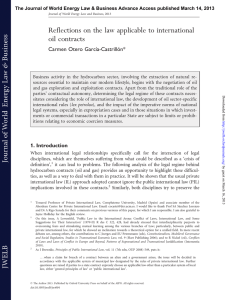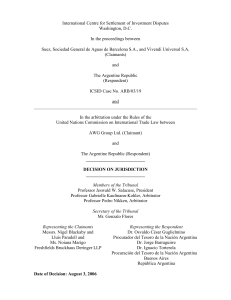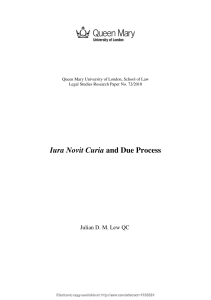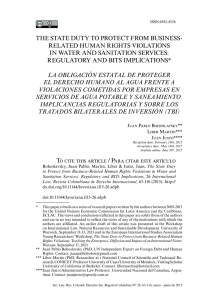Preliminary Rulings in Investment Arbitration
Anuncio
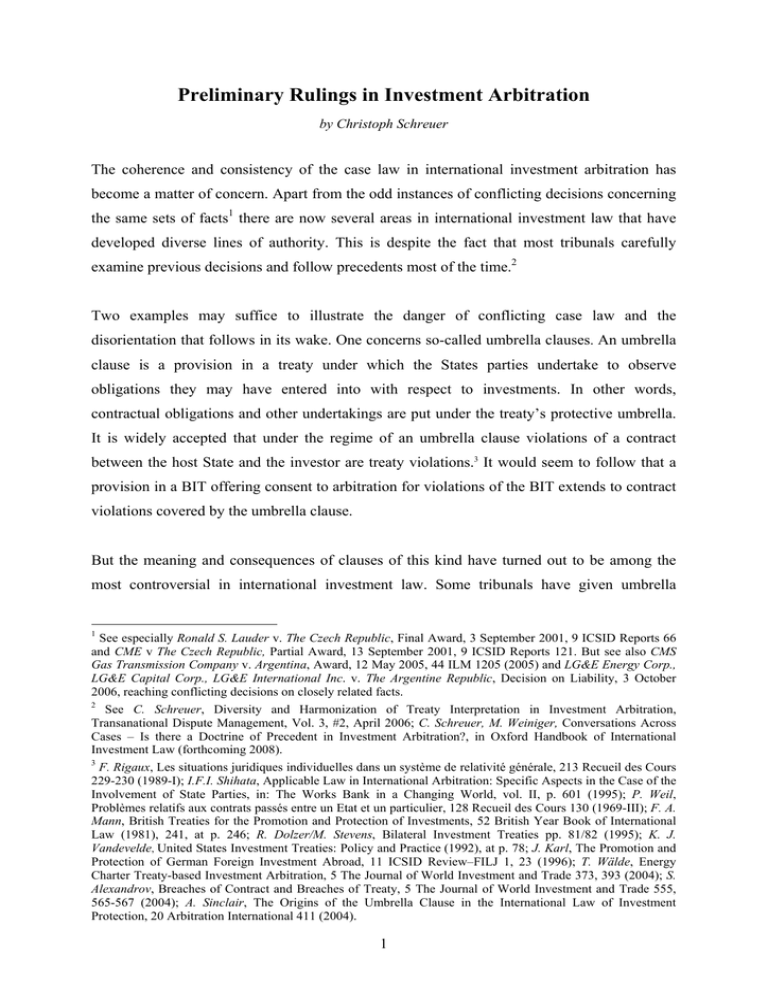
Preliminary Rulings in Investment Arbitration by Christoph Schreuer The coherence and consistency of the case law in international investment arbitration has become a matter of concern. Apart from the odd instances of conflicting decisions concerning the same sets of facts1 there are now several areas in international investment law that have developed diverse lines of authority. This is despite the fact that most tribunals carefully examine previous decisions and follow precedents most of the time.2 Two examples may suffice to illustrate the danger of conflicting case law and the disorientation that follows in its wake. One concerns so-called umbrella clauses. An umbrella clause is a provision in a treaty under which the States parties undertake to observe obligations they may have entered into with respect to investments. In other words, contractual obligations and other undertakings are put under the treaty’s protective umbrella. It is widely accepted that under the regime of an umbrella clause violations of a contract between the host State and the investor are treaty violations.3 It would seem to follow that a provision in a BIT offering consent to arbitration for violations of the BIT extends to contract violations covered by the umbrella clause. But the meaning and consequences of clauses of this kind have turned out to be among the most controversial in international investment law. Some tribunals have given umbrella 1 See especially Ronald S. Lauder v. The Czech Republic, Final Award, 3 September 2001, 9 ICSID Reports 66 and CME v The Czech Republic, Partial Award, 13 September 2001, 9 ICSID Reports 121. But see also CMS Gas Transmission Company v. Argentina, Award, 12 May 2005, 44 ILM 1205 (2005) and LG&E Energy Corp., LG&E Capital Corp., LG&E International Inc. v. The Argentine Republic, Decision on Liability, 3 October 2006, reaching conflicting decisions on closely related facts. 2 See C. Schreuer, Diversity and Harmonization of Treaty Interpretation in Investment Arbitration, Transanational Dispute Management, Vol. 3, #2, April 2006; C. Schreuer, M. Weiniger, Conversations Across Cases – Is there a Doctrine of Precedent in Investment Arbitration?, in Oxford Handbook of International Investment Law (forthcoming 2008). 3 F. Rigaux, Les situations juridiques individuelles dans un système de relativité générale, 213 Recueil des Cours 229-230 (1989-I); I.F.I. Shihata, Applicable Law in International Arbitration: Specific Aspects in the Case of the Involvement of State Parties, in: The Works Bank in a Changing World, vol. II, p. 601 (1995); P. Weil, Problèmes relatifs aux contrats passés entre un Etat et un particulier, 128 Recueil des Cours 130 (1969-III); F. A. Mann, British Treaties for the Promotion and Protection of Investments, 52 British Year Book of International Law (1981), 241, at p. 246; R. Dolzer/M. Stevens, Bilateral Investment Treaties pp. 81/82 (1995); K. J. Vandevelde, United States Investment Treaties: Policy and Practice (1992), at p. 78; J. Karl, The Promotion and Protection of German Foreign Investment Abroad, 11 ICSID Review–FILJ 1, 23 (1996); T. Wälde, Energy Charter Treaty-based Investment Arbitration, 5 The Journal of World Investment and Trade 373, 393 (2004); S. Alexandrov, Breaches of Contract and Breaches of Treaty, 5 The Journal of World Investment and Trade 555, 565-567 (2004); A. Sinclair, The Origins of the Umbrella Clause in the International Law of Investment Protection, 20 Arbitration International 411 (2004). 1 clauses their full effect.4 Others have doubted the effect of such clauses and have held that they cannot be meant to extend the protection of an investment treaty to ordinary commercial contracts.5 Another example concerns the applicability of most favoured nation (MFN) clauses in investment treaties to the provisions on dispute settlement in these treaties. Some tribunals have held that MFN status enabled the claimant to select the more favourable arrangements on dispute settlement in treaties between the respondent State and third States.6 Others have vigorously denied the applicability of MFN clauses to dispute settlement.7 It is evident that a system that operates with a large number of differently composed tribunals is vulnerable to discrepancies of this kind. Even well meaning and competent arbitrators are unlikely to agree on all points all the time. Courts with a permanent composition are more likely to produce a consistent case law. But a permanent court for investment disputes is an unlikely goal, at least for the time being. There are several conceivable methods to achieve a measure of harmonization in the decisions of tribunals. An appeals procedure would be one possibility. But appeals procedures carry obvious disadvantages and their establishment would encounter a number of obstacles only one of which is Article 53(1) of the ICSID Convention.8 Article 53(1) would have to be either amended, a near impossible task, or circumvented, which is awkward to say the least. 4 SGS v. Philipines, Decision on Jurisdiction, 29 January 2004, 8 ICSID Reports 518, paras. 125, 128; CMS v. Argentina, Award, 12 May 2005, paras. 296-303; Eureko v. Poland, Partial Award, 19 August 2005, paras. 244260; Eureko v. Poland, Partial Award, 19 August 2005, paras. 244-260; Noble Ventures v. Romania, Award, 12 October 2005, paras. 42-62; Siemens v. Argentina, Award, 6 February 2007, para. 206. 5 SGS v. Pakistan, Decision on Jurisdiction, 6 August 2003, 8 ICSID Reports 383 at paras. 163-173; Joy Mining v. Egypt, Award, 6 August 2004, para. 81; El Paso v. Argentina, Decision on Jurisdiction, 27 April 2006, paras. 66-86; Pan American Energy v. Argentina, Decision on Preliminary Objections, 27 July 2006, paras. 92-115. 6 Maffezini v. Spain, Decision on Jurisdiction, 25 January 2000, 5 ICSID Reports 396, paras. 38-64; Siemens v. Argentina, Decision on Jurisdiction, 3 August 2004, paras. 32-110; Gas Natural v. Argentina, Decision on Jurisdiction, 17 June 2005, paras. 24-31, 41-49; Suez, Sociedad General de Aguas de Barcelona S.A., and InterAguas Servicios Integrales del Agua S.A. v. Argentina, Decision on Jurisdiction, 16 May 2006, paras. 5266; National Grid PCL v. Argentina, Decision on Jurisdiction, 20 June 2006, paras. 53-94; Suez, Sociedad General de Aguas de Barcelona S.A., and Vivendi Universal S.A. v. Argentina and AWG Group Ltd. v. Argentina, Decision on Jurisdiction, 3 August 2006, paras. 52-68. 7 Salini v. Jordan, Decision on Jurisdiction, 29 November 2004, para. 119; Plama v. Bulgaria, Decision on Jurisdiction, 8 February 2005, 44 ILM 721 (2005), paras. 183, 184, 223, 227; Telenor v. Hungary, Award, 13 September 2006, paras. 90-100. 8 Article 53(1) of the ICSID Convention provides in relevant part: “The award shall be binding on the parties and shall not be subject to any appeal or to any other remedy except those provided for in this Convention.” 2 The most effective way to achieve judicial coherence and consistency is not necessarily to submit decisions to review and reversal. Appeal presupposes a decision that has been made already, that will be attacked for a perceived flaw and that may be revised and repaired. Rather than remedy the damage after it has occurred, it is more sensible to address the problem of inconsistency through preventive action. A method to secure the coherence of case law that has been remarkably successful is to allow for preliminary rulings while the original proceedings are still pending.9 Under such a system a tribunal would suspend proceedings and request a ruling on a question of law from a body established for that purpose. This procedure has been applied with a large measure of success in the framework of European Community law.10 It effectively secures the uniform application of European law by domestic courts in all member States through preliminary rulings of the Court of Justice of the European Communities (European Court). Article 234 (formerly Article 177) of the Treaty establishing the European Community (TEC) provides: The Court of Justice shall have jurisdiction to give preliminary rulings concerning: (a) (b) (c) the interpretation of this Treaty; the validity and interpretation of acts of the institutions of the Community and of the ECB; the interpretation of the statutes of bodies established by an act of the Council, where those statutes so provide. Where such a question is raised before any court or tribunal of a Member State, that court or tribunal may, if it considers that a decision on the question is necessary to enable it to give judgment, request the Court of Justice to give a ruling thereon. Where any such question is raised in a case pending before a court or tribunal of a Member State against whose decisions there is no judicial remedy under national law, that court or tribunal shall bring the matter before the Court of Justice. Under Article 234 TEC, any national court or tribunal of a Member State may decide to refer a question with regard to the interpretation (or validity) of European community law to the 9 The idea has been put forward before: see G. Kaufmann-Kohler, Annulment of ICSID Awards in Contract and Treaty Arbitrations: Are there Differences?, in in E. Gaillard/Y. Banifatemi (eds.), Annulment of ICSID Awards 289 (2004). See also G. Kaufmann-Kohler, In search of Transparency and Consistency: ICSID Reform Proposal, TDM, vol. 2, No. 5, p.8 (2005). 10 See especially: P. Craig and G. De Búrca, EU Law. Text, Cases and Materials, 3d ed., (2003) pp. 432-481; M. Andenas (ed.), Article 177 References to the European Court – Policy and Practice (1994); D. Anderson, Preliminary Rulings (1995); A. Dashwood and A. Johnston (eds.), The Future of the Judicial System of the European Union (2001); G. De Búrca and J.H.H. Weiler (eds.), The European Court of Justice (2001); H. Schermers, C. Timmermans, A. Kellerman and J. Stewart Watson, Article 177 EEC: Experiences and Problems (1987); 3 European Court, when a decision on that question is necessary to enable the national court to give a judgment. Where such a question is raised before a court of last instance, the court is under an obligation to request a preliminary ruling from the European Court. Article 234 TEC ensures that questions regarding the interpretation of community law are referred to the European Court before the judgment is rendered. Article 234 TEC establishes the “interpretative monopoly” of the European Court with regard to community law and assures its uniform interpretation by national courts. Preliminary rulings help to avoid divergent interpretations and further the efficient application of community law ex ante. They are preferable to the frequently cumbersome appellate mechanisms which are engaged ex post. The preliminary rulings procedure is based on the close cooperation between national courts and the European Court. It is widely accepted in practice and frequently used by national courts. Proceedings for preliminary rulings are always initiated by a national court and not by one of the parties. The parties to the original proceedings as well as Community organs have the opportunity to submit observations in these proceedings. There is also a hearing. The preliminary ruling is rendered in the form of a judgment. The decision binds the domestic court that requested the ruling as well as any courts which may have to decide the same case in appeal. Preliminary rulings also have a strong impact on national courts in other cases dealing with the same or similar questions. This procedure promotes the uniform interpretation and application of community law even before the judgment of the domestic court is rendered. Article 234 has turned out to be of seminal importance for the development of community law. It is through preliminary rulings that the European Court has developed some of the most central concepts and principles of community law. Specifically, Art 234 has been the principal means through which the relationship between the national and Community legal systems has been developed. Adapted to investment arbitration this method could provide for an interim procedure whenever a tribunal is faced with an important question. Such an important question may be described as a fundamental issue of investment treaty application, a situation where the 4 tribunal wants to depart from a “precedent” or where there are conflicting previous decisions. In such a situation the tribunal might be required to suspend proceedings and request a ruling. Once that ruling has been forthcoming, the original tribunal would resume its proceedings and reach an award on the basis of the guidance it has received through the preliminary ruling. This method could become a successful means to ward off inconsistency and fragmentation. A mechanism of this kind would require the establishment of a central and permanent body that would be authorised to give preliminary rulings. A permanent body of this kind would be less ambitious than a permanent court for the adjudication of investment disputes. It would not do away with the basic structure of current investment arbitration consisting of a multitude of individual tribunals. But, if successfully used, it could guarantee a large measure of harmonization without depriving the tribunals of their basic competence to adjudicate the cases submitted to them. Preliminary rulings would leave Article 53 of the ICSID Convention untouched. A mechanism of this kind would not provide an appeal or remedy against awards contrary to the ICSID Convention. Preliminary rulings would not affect the principle of finality. The delay caused by a request for a preliminary ruling would be much more limited than an appeals procedure that sets in only after the original proceedings have resulted in an award. Whereas an appeals procedure might reach a measure of consistency through a costly and time consuming repair mechanism, preliminary rulings could help to prevent the development of inconsistencies in the first place. A number of details would have to be worked out. One is under what circumstances a tribunal would request a preliminary ruling and whether it would be under an obligation to do so. Another question would be whether these rulings would bind the tribunal or would merely constitute recommendations. Not least, the composition of a body charged with giving preliminary rulings would require detailed discussion. 5
